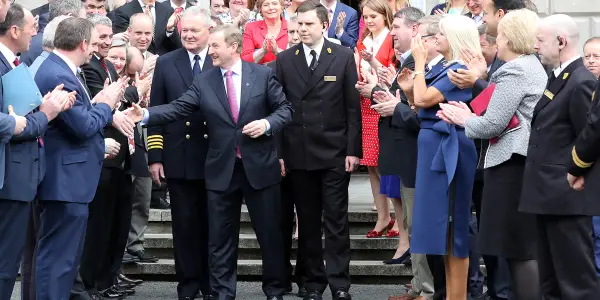Taoiseach Enda Kenny has vowed to make life better for everyone after securing a history-making back-to-back term in office.
The premier named five women in his cabinet and pledged to make people’s experiences as important as tax returns and economic data.
Mr Kenny said his minority government – propped up by decades-old adversaries Fianna Fail on the opposition benches and a diverse group of independents – was facing an unprecedented challenge and opportunity.
“Its formation proves that politics is not about power and its attainment,” he said.
“It is rather that politics is always about what is possible, about the possibility of what can be achieved. And achieved not for parties or individuals or sectors, but for the whole country.”
The Fine Gael leader scraped into power at the fourth time of asking, 70 days on from one of the most divisive elections in the Republic’s history.
The Taoiseach has opposition support, albeit fragile and for only three years, on a select number of issues such as suspending and reviewing water bills and easing unprecedented housing and homelessness.
Mr Kenny identified the record levels of homelessness and housing waiting lists, health and pressure on working families as some of the key issues facing the country.
“We must ask how alive are we willing to be to the experience of all our citizens, and to the opinions of those with whom we differ or even strongly disagree,” he said.
Mr Kenny’s back-to-back success as Taoiseach – a first for Fine Gael – was achieved after seven weeks of negotiations.
And he also warned the historic arrangement with Fianna Fail and others will test democracy and the character of politicians.
He said one of his immediate concerns was the threat of Brexit and announced plans for several trips to Britain and Northern Ireland to canvass Irish citizens and business people to vote for the UK to remain.
Outlining policies closer to home, Mr Kenny said the new government’s priority will be for more affordable childcare, more and better jobs, lower taxes on workers, help for low paid workers and safer streets.
Housing was described as an “urgent challenge”, with a new minister tasked with easing the crisis and a spring economic statement to be published to set out where money will be spent.
New investment in hospitals and primary care centres will follow, Mr Kenny said, and there will be specific focus on disability and mental health issues.
Finian McGrath has been given a new junior ministry to oversee disability issues.
Mr Kenny also raised concerns about mental health issues.
“It is clear that our children and teenagers especially need support to navigate a world that, while it can be marvellous, can also be merciless,” he said.
In the first 100 days of the government, a new housing action plan will be published and a task force on youth mental health will be set up to identify resources for troubled young people and their families.
Mr Kenny also said a political commitment was needed to drive suicide prevention strategy.
“It is up to all of us every day to make the difference,” he said.
“I wish for Ireland to become more aware of how we depend not alone on those in our community, but frequently on the kindness of strangers.
“We must be that kind stranger ourselves.”
The February 26 general election split the vote like never before and left the country locked in a political stalemate for 10 weeks.
Fine Gael and Fianna Fail, the traditionally dominant parties who swapped power for generations and whose bitter enmity stems back to the Irish civil war, balked at pressure to form a “grand coalition”.
Mr Kenny said the hung parliament thrown up by the election meant no party has a mandate to “instruct, force, direct or coerce” anyone else.
Mr Kenny was re-elected Taoiseach by 59 votes to 49, largely with thanks to the abstention of Fianna Fail.
Among the independents to support him were Katherine Zappone, a gay and women’s rights campaigner, and Michael Lowry, a former cabinet colleague.
Two factions of Independents – known as the Independent Alliance and the rural alliance – were then pulled in but not without a few casualties.
Michael Fitzmaurice, a Roscommon Galway TD and former Turf Cutters and Contractors Association leader, was the most high profile, having been a vocal figure in negotiations over the last few weeks.
